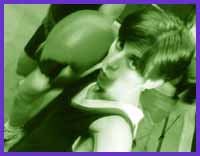They didn’t come out until after they’d made made it big. Now these johnny-come-latelies are role models for gay and lesbian youth.
Four of Canada’s elite athletes – or former elite athletes – will speak on a Pride panel targeting queer youngsters.
And organizer Janis Purdy says it was impossible to find athletes still in mid-career to speak at the event, Sports Heroes Paving The Way For Queer Youth
“It’s always difficult to understand what their reasons are, but I could read between the lines,” she says, speculating that fear of losing corporate sponsorship may be the reason for some of the refusals.
“You know that when you have to [refuse], you’re in an environment [where] there’s a lot of homophobia.”
Figure-skater Brian Orser and a top-notch name in women’s hockey said no.
Purdy acknowledges that the lack of practising athletes on the panel may give some kids a mixed message – but she says the speakers will address this. “It will come out through their stories.”
The Vancouver-based Betty Baxter played Olympic volleyball in ’76 and was the first female head coach of the National Program (from 1979 to ’82). She was fired because she’s a lesbian.
All of the panelists agree that sports helped them through adolescence. “Swimming saved my life,” says gold medal swimmer Mark Tewksbury, 31. “I was so ostracized in high school. [Swimming] gave me a place where people wanted to be like me. It gave me confidence.”
Purdy, the coordinator for the Supporting Our Youth Program, sees an important role for sports and young people.
“It’s difficult to be out when you’re into athletics. Lots of kids come out and then leave sports. The only alternative is the club scene.
“They shouldn’t have to choose.
“Youth under 19 are becoming a subculture in our community. When I was a counsellor with lesbian and gay youth, I would often encourage those young people to participate in the gay/ lesbian teams. They came back and said they were the youngest people of the team by about 10 years.”
Two of the panelists are boxers.
Silver medalist Mark Leduc, 41, who now designs and constructs film sets, says he’s never met another gay boxer. And he was always an athlete first.
“Sexuality is not the main focus. I was out to myself and that’s all that mattered. I didn’t feel threatened by what society thought a man was. I was a fighter and society thought a fighter was a man.”
Feeling strong is especially important for girls and women, says Savoy Howe, part of the first sanctioned women’s bout boxing.
Howe got into the sport at age 26 and found boxing was “a cool way to express healthy aggression.” She describes the jealousy some male boxing coaches felt when she started attracting more students than they did – one coach even got into a physical confrontation with her.
“There’s a part of us that’s really pissed off at the world for not remaining loyal to us after the whole coming out process. It’s confusing because once you’ve had that loyalty and then it’s taken away – I think it’s hard on kids.”
Free seats are available to youth. Contact Purdy at (416) 924-2100 ext 264.
Sports Heroes Paving The Way For Queer Youth.
$20. 8pm. Mon, Jun 21.
Buddies In Bad Times.
12 Alexander.
(416) 975-8555.

 Why you can trust Xtra
Why you can trust Xtra


